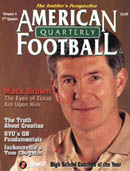Article CategoriesAFM Magazine
|
Q&A With Mack Brown© More from this issueQ: When you came in, you talked about reaching out to the high school coaches. Now did you find the things that you did were any different than your philosophies at Carolina, or just something not done in Texas in recent years? A: I'm not sure what's been done in here in the past, and I'd rather not look back. We're doing the same things here that we did at Tulane and at North Carolina. We enjoy the high school coaches, we know they are the lifeblood of college football regardless of what state you're in. We had a tremendous relationship with those guys back at North Carolina and in Louisiana and feel like we are in process of developing the same thing here. We could not have had the recruiting year we had coming in without the help of a lot of high school coaches encouraging the guys to stay in-state. Q: What were some of....The full article can only be seen by subscribers. |
|
|||||||
| HOME |
MAGAZINE |
SUBSCRIBE | ONLINE COLUMNISTS | COACHING VIDEOS |
Copyright 2026, AmericanFootballMonthly.com
All Rights Reserved





